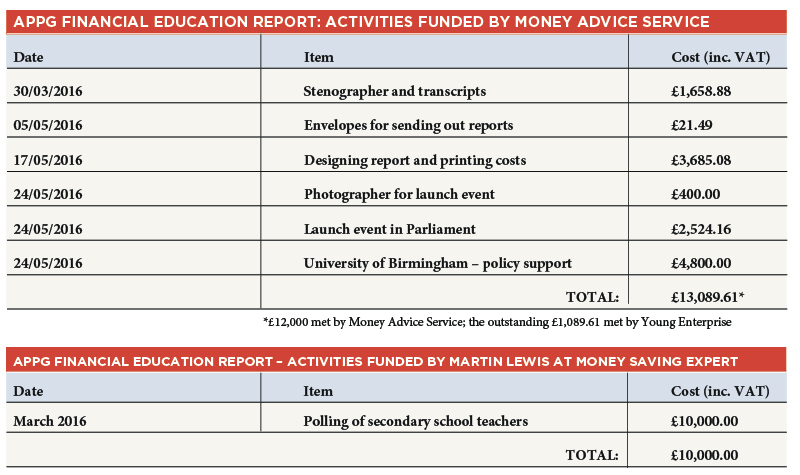Beginning this week, Schools Week is revealing its first investigation into all-party parliamentary groups (APPGs), uncovering how they influence education, set up meetings, and how they can label a report as “all-party” – when in reality it is the work of a single external body.
Q: When is a report by MPs not actually a report by MPs?
A: When it has been written by another organisation, but is presented as a cross-party publication by MPs and has politicians’ names smattered across it.
There are 19 education APPGs, but the financial education APPG, whose secretariat is the charity Young Enterprise has the highest amount of needed resources – between £34,501 to £36,000.
The figure does not indicate wrong practice, but is symbolic of what Young Enterprise estimates it costs its staff to run research inquiries plus do marketing and PR for the APPG.
The costs are covered by Young Enterprise’s supporters and donors using unrestricted funds. The charity is more broadly supported by a number of partners, including J.P. Morgan, Asda, and the Department for Education.
While the estimate is tens of thousands higher than most other education APPG costs (usually about £3,000) the financial education APPG is also one of the largest with 195 members.
Speaking to Schools Week, a Young Enterprise spokesperson said the funding was the estimated cost of publicising and researching, but said not all groups were as transparent about their costs.
A number of groups with external secretariats do not register their salary costs
“A number of groups with external secretariats do not register their salary costs – despite members of their staff working on the group’s activities – but in the interests of transparency we chose to include this as part of our annual registration of estimated costs.”
Since starting in 2011, the financial education APPG has produced four reports: three while its secretariat was Pfeg (Personal Finance Education Group) and one under Young Enterprise (which took over Pfeg in September 2014).
Three of the reports linked financial education to specific school practices: one on curriculum, one on further education, and one for vulnerable young people. The most recent report was a retrospective, Financial Education in Schools: Two Years On – Job Done?

The reports influenced financial education becoming a compulsory part of the secondary curriculum, and its insertion into the new mathematics and citizenship curriculum.
Yet, Schools Week learned that while the APPG labels its reports as an “all-party parliamentary” report, they are completed by Young Enterprise in a combined effort with MPs.
The charity used “the guidance of MPs”, as well as evidence MPs gleaned from cross-questioning witnesses on financial education, to put together its most recent report.
Money Advice Service, the government debt service, contributed £12,000 to the most recent report, while a poll of secondary school teachers for the report was funded through £10,000 from Martin Lewis, founder of Money Saving Expert.
Other APPGs, such as one on sixth-form colleges, choose not to badge work done by the Sixth Form Colleges Association (SFCA) as all-party parliamentary report and keeps them separate.
James Kerwin, deputy chief executive of the SFCA, said: “We use our research to brief APPG members, rather than produce joint publications.
“This is not something I would rule out, but the model we use at the moment is simple and works well for us.”
The group has produced more reports than the overarching education APPG, whose secretariat estimates an annual cost of £22,501 to £24,000, yet has produced just one report in six years.
Follow the story next week to find out more.
This article has been updated to correct two inaccuracies in an earlier version. It previously stated that Money Advice Service had funded three prior reports for the APPG. These reports were actually funded by Pfeg. The article also previously stated that the APPG costs solely covered PR and marketing. Research and inquiry costs should also have been included. Finally, wording has been updated to make clear that the named Young Enterprise donors fund work more widely across the organisation and not the APPG reports specifically.
Save
Save








Publishing papers labelled ‘all party’ when they’re actually written by other groups is deceitful. Thanks for investigating this.